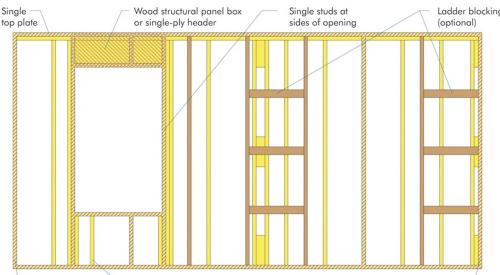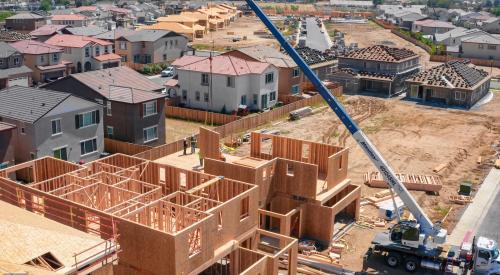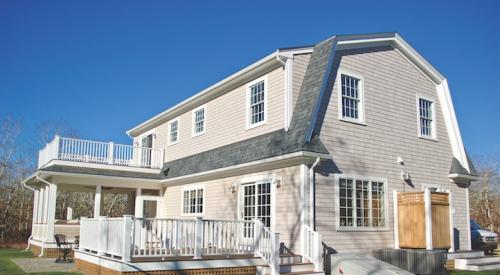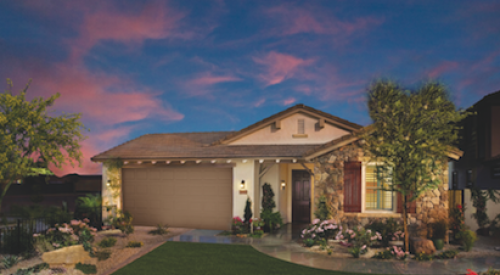S.K. Clark, which builds 10 $500,000-plus custom homes a year, is diversifying by adding a line of modular homes built by Genesis Homes, a division of manufactured housing giant Champion Homes. Genesis builds S.K. Clark's home modules - typically two to four per house - in a controlled factory environment in Claysburg, Pa., and then transports and installs them on their prepared sites in Widewater.
What seals the deal for S.K. Clark? Once crews marry the modules and do minimal finish work, the Genesis homes are indistinguishable from site-built homes, inside and out. More important, S.K. Clark can do four times as many modulars in the time it takes to build one of its custom homes.
"Modulars can cut your time frame down considerably," says Mark Clark, project manager for S.K. Clark's modular housing. "It's a way we can build a whole lot more houses. We may not be making as much on each as we do on our higher-end houses, but if we do enough of them, we can make the same amount in the same time period."
| The homes in Widewater Village echo cherished, traditional American housing styles. The modular homes — with front porches, 9-foot ceilings and crown and base molding - come from Genesis Homes' Americana series. Each module arrives by truck, and the home, which generally consists of from two to four modules, can be set in a day. |
Still in the first phase of Widewater, Clark is still working out the margins but estimates his firm makes 30% less on each modular home while increasing its home volume 300%. The partnership with Genesis reduces some of S.K. Clark's direct and indirect costs because homes are built faster, construction loan finance charges are fewer and costs for supervising crews fall. S.K. Clark also benefits from Genesis' buying power on materials.
Although S.K. Clark doesn't make huge money doing modular, it does capture a whole new buyer segment in a competitive market. Typical buyers of Widewater homes, priced from $261,000 to $299,000, are young professionals and military personnel, often married with young children, as well as some empty nesters. Many commute to Washington, 35 miles away.
Ready, Set, Go
As with any new venture, going modular involves a learning curve. Scheduling still represents the biggest challenge to getting it done and on time. In Widewater Village, S.K. Clark averages three months from contract to closing. Although modular requires exponentially fewer subcontractors, the builder still must coordinate the subs' availability with the delivery date, as well as with the deliveries for the three other firms that build homes in the community.
Also, each home arrives on two to four trucks, and crews use a crane to set the house on its 50x100-foot lot, so maneuverability, especially of large trucks, can be limited. Once a buyer signs a contract and S.K. Clark orders the home plan the buyer selected, the builder readies the site. Widewater Village lots are fee-simple and delivered already finished. The builder prepares the site and pours the basement. The trucks loaded with the modules arrive at night, generally on a Sunday, so setting the home can begin in the morning. The home arrives 80-90% complete, with the roof folded for transport.
|
Construction Quality
Mark Clark says he doesn't worry about quality and durability with Genesis Homes' modular houses. Genesis' construction practices and materials mirror those used for site-built homes, and to help its homes endure transport, the manufacturer often builds them with more lumber than is used in site-built houses. S.K. Clark's Genesis homes include:
|
S.K. Clark contracts with Genesis to set a home on its foundation - which takes less than a day - finish the roof and ensure that the home is watertight. Genesis also does almost all of the finish work, although some builders opt to have their crews finish homes. The finish work includes drywalling interior walls where two modules come together, repairing minor drywall cracks that might have occurred in transit, painting, completing exterior siding, and building the porch and garage. The homes arrive with full plumbing, so S.K. Clark's subs only have to hook it up, as well as do the driveway and sidewalk work. Before the drywall is finished, S.K. Clark's HVAC crews install ducts in wall chases and hook them into the factory-installed registers. Carpet and hardwood flooring can be factory-installed as well, but S.K. Clark has its subs handle that installation to prevent damage.
The process takes 1 1/2 months from set to finish. Mark Clark says he plans to stick with Genesis crews in subsequent phases but might use his own crews for everything eventually.
Give the Market What It Wants
Developed by EST LLC, Widewater Village was zoned and approved for manufactured homes meeting Department of Housing and Urban Development code, but a look at the bedroom community's buyers caused EST to switch gears and create a 430-home modular community with multiple builders.
"The marketplace was changing so rapidly that it became evident a product in keeping with market trends would be more appropriate than HUD-code homes," EST partner Tony Sala says. "The market is demanding certain whistles and bells: 9-foot ceilings, two-story spaces, hardwood stairs, upgraded appliances, crown molding.
"We're certainly very happy with it, the county is pleased, and it exceeds the expectations many people had." Expectations can be a barrier with factory-built housing. Mobile homes and trailer parks still come to mind for many people, despite great strides by an industry changing to meet market demands. Widewater's modular homes differ from HUD-code housing in many ways, not the least of which is that they don't fall under the jurisdiction of HUD code. Instead, they must adhere to site-built codes. Third-party engineers and inspection agencies review and approve the house plans, and then they monitor construction in the factory at virtually the same milestones as for a site-built house. Once the house is set and finished, it must pass on-site inspections of the finish work, including the roof and how the home attaches to its foundation.
The homes really do look site-built. S.K. Clark chose a new line from Genesis, the Americana series, and offers six plans - five two-story and one ranch - ranging from 1,529 to 2,346 square feet.
| The factory-built process is a model of efficiency and construction quality, with no weather-related delays or waiting for subcontractors. One Genesis facility, Redmond Homes of Indiana, can put out four modular homes a day. A foam sealant attaches drywall to the studs of this interior wall. No nails means no nail pops during transport or after the house is set. |
The largest and most popular plan, Eaglegate, accounted for seven of the first 14 home sales in Widewater's first phase. Designed in the Colonial Revival style, it features a front porch, six-pane windows and vinyl clapboard siding. Inside, an efficient box-on-box plan with family room, kitchen, nook, powder room, laundry and great room circulates around a central stair on one side wall. The master suite sits at the back of the second level, along with three more bedrooms and a bathroom. The finishes, appliances and upgrades are consistent with or better than those of other homes in Eaglegate's price range, says Beverly Rose Sala, an independent broker and S.K. Clark's sales manager in Widewater.
The community offers a great deal of amenities and value, too. A gated community, Widewater Village features a swimming pool, tot lot and clubhouse. A homeowners association fee of about $100 a month pays to maintain the private street and all front lawns, as well as for basic cable.
"I didn't know how receptive the home buying public would be to manufactured housing," Beverly Rose Sala says. "I expected to do a lot of explaining and showing what a quality product this is, and how it's evolved over the years." Instead, she says, buyers rarely ask many questions about it, and perception has not posed a challenge. "No one cares," she says. "They accept it very readily and feel comfortable with it."











